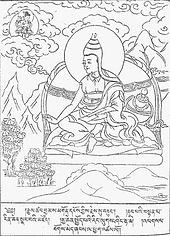- Maitreya-nātha
-
Tibetan depiction of Asaṅga receiving teachings from Bodhisattva Maitreya in Tuṣita Heaven.

Maitreya-nātha (ca. 270-350 CE) is a name whose use was pioneered by Buddhist scholars Erich Frauwallner, Giuseppe Tucci, and Hakiju Ui to distinguish one of the three founders of the Yogācāra school of Buddhist philosophy, along with Asaṅga and Vasubandhu.[1] Some scholars believe this "Maitreya" to be a historical person in India. The traditions themselves have held that it is referring to the bodhisattva Maitreya
Contents
Academic views
Scholars are divided in opinion whether the name denotes a historical human teacher of Asaṅga or the bodhisattva Maitreya.
Louis de La Vallée Poussin stated that Maitreya-nātha is not the name of a man, but rather "He who is protected by Maitreya". He considers Natha to be a synonym of buddha, or more precisely bhagavat.[2]
Traditional view
The Buddhist traditions themselves have always held that Asaṅga received the texts in question from Bodhisattva Maitreya directly in Tuṣita heaven. Asaṅga is said to have spent many years in intense meditation, during which time tradition says that he often visited Tuṣita Heaven to receive teachings from the bodhisattva Maitreya. Heavens such as Tuṣita Heaven are said to be accessible through meditation. Xuanzang tells the account of these events:[3]
“ In the great mango grove five or six li to the southwest of the city (Ayodhya), there is an old monastery where Asaṅga Bodhisattva received instructions and guided the common people. At night he went up to the place of Maitreya Bodhisattva in Tuṣita Heaven to learn the Yogācārabhūmi-śāstra, the Mahāyāna-sūtra-alaṃkāra-śāstra, the Madhyānta-vibhāga-śāstra, etc.; in the daytime, he lectured on the marvelous principles to a great audience. ” Confusion over the idea of "supernaturally" visiting heavens may be due to the unfamiliarity of scholars with the Indian concept of heavens as being accessible through samādhi. Other advanced meditators recorded similar experiences of visiting Tuṣita Heaven at night.[4] One such example of this is Hanshan Deqing during the Ming Dynasty. In his autobiography, Hanshan describes the palace of Maitreya in Tuṣita, and hearing a lecture given by Bodhisattva Maitreya to a large group of his disciples. He recounts Maitreya as having said:[5]
“ That which discriminates is consciousness; that which does not discriminate is Wisdom. From relying on consciousness, defilements come; from relying on Wisdom, purity comes. From the defilements arise birth and death. In the purity, there are no buddhas. ” Attributed works
The number of works attributed to him vary in the traditions of Tibetan Buddhism and Chinese Buddhism, but variously include:
- the Yogācāra-bhūmi-śāstra
- the Mahāyāna-sūtrālamkāra-kārikā
- the Dharma-dharmatā-vibhāga
- the Madhyānta-vibhāga-kārikā
- the Abhisamaya-alamkāra
- the Ratna-gotra-vibhaga, also known as the Uttaratantrashastra
The last five works are often referred to, collectively as the Five Dharmas of Maitreya, and their authorship is given variously to Maitreyanatha, Asaṅga or a combination thereof.
See also
Notes
- ^ Being as Consciousness: Yogācāra Philosophy of Buddhism. Tola, Fernando and Carmen Dragonetti. Motilal Banarsidass: 2004 pg xv
- ^ La Vallée Poussin, Louis de, Abhidharmakosabhasyam, Vol.1, p.15, English translation by Leo M. Pruden, Asian Humanities Press, Berkeley, California: 1991
- ^ Rongxi, Li. The Great Tang Dynasty Record of the Western Regions., Numata Center, Berkeley, 1996, p. 153.
- ^ Sangharakshita. The Eternal Legacy: An Introduction to the Canonical Literature of Buddhism, Windhorse Publications, Birmingham, 2006, p. 248
- ^ Sangharakshita. The Eternal Legacy: An Introduction to the Canonical Literature of Buddhism, Windhorse Publications, Birmingham, 2006, p. 248
Categories:- Buddhist philosophers
- Year of birth uncertain
- 350 deaths
Wikimedia Foundation. 2010.

